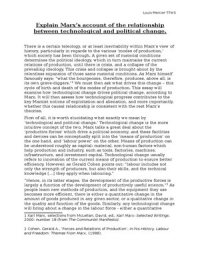Louis Mercier TTW5
Explain Marx’s account of the relationship
between technological and political change.
There is a certain teleology, or at least inevitability within Marx’s view of
history, particularly in regards to the various ‘modes of production,’
which society has been through. A given set of material conditions
determines the political ideology, which in turn maintains the current
relations of production, until there is crisis, and a collapse of the
prevailing ideology. This crisis and collapse is brought about by the
relentless expansion of those same material conditions. As Marx himself
famously says; “what the bourgeoisie, therefore, produces, above all, is
its own grave-diggers.”1 We must then ask what drives this change – this
cycle of birth and death of the modes of production. This essay will
examine how technological change drives political change, according to
Marx. It will then assess how technological progress contributes to the
key Marxist notions of exploitation and alienation, and more importantly,
whether this causal relationship is consistent with the rest Marx’s
theories.
First of all, it is worth elucidating what exactly we mean by
‘technological and political change.’ Technological change is the more
intuitive concept of the two. Marx talks a great deal about the
‘productive forces’ which drive a political economy, and these facilities
and devices can be conceptually split into the ‘means of production’ on
the one hand, and ‘labour power’ on the other. Means of production can
be understood roughly as capital: material, non-human factors which
help production and industry, such as tools, factories, machines,
infrastructure, and investment capital. Technological change usually
refers to innovation of the current means of production to ensure better
efficiency. However, as Gerald Cohen points out: “labour includes not
only the strength of producers, but also their skills, and the technical
knowledge […] they apply when labouring.”
“Hence, in its latter stages, the development of the productive forces is
largely a function of the development of productively useful science.”2 As
people learn new methods of production, and the equipment they use
becomes more efficient, there is either a quantitative change in the
amount of goods produced in any given sector, or a qualitative change in
the quality and function of the goods. Similarly, any technological change
will bring about a change in the labour force - either a quantitative
1 Karl Marx, selections from McLellan, David, ed., Karl Marx: Selected Writings,
2000: number 18 (from The Communist Manifesto).
2 Cohen, Gerald A., ‘Forces and Relations of Production’, in his History, Labour
and Freedom: Themes from Marx, (1988).




